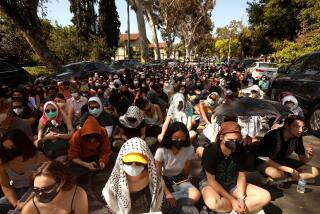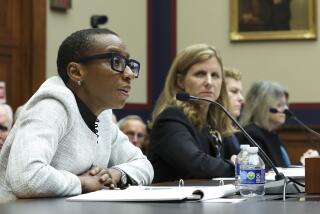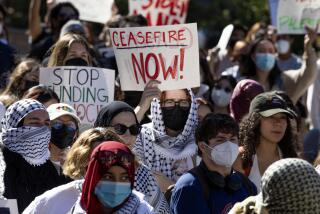Editorial: Shutting down campus speech is a great way to lose an argument
The best way to refute the arguments that “War on Cops” author Heather Mac Donald makes in her book about policing in America is to read it and systematically dissect her assertions point by point. A decent backup plan might be to attend one of her campus lectures — like the one she delivered last week at Claremont-McKenna College by live stream after protesters blocked the entrance of the hall at which she was speaking — and subject her statements to pointed questioning and critique.
Instead, the approximately 250 protesters whittled even shallower arguments into shouted slogans that they paired with a display of brute force, declaring in essence that there was no debate to be had, because they had already done all the thinking and drawn all the conclusions and no one else need inquire into the issue. That’s an assertion, and those are tactics, that would be frighteningly familiar to anyone who has suffered under a populist but repressive dictator.
The only thing that was shut down was tough questioning of the sort that Mac Donald encountered at a recent talk at UCLA.
It’s also a laughably dated approach, as if the protesters were shutting down a campus speaker sometime in the early 1990s, before cellphone cameras, live streaming and social media. Those no-longer-new technologies allowed Mac Donald’s talk to proceed and to be heard then or later by anyone who cared to listen. The only thing that was shut down was tough questioning of the sort that Mac Donald encountered at a recent talk at UCLA. The Claremont protesters, in other words, silenced their own arguments but not Mac Donald’s. In fact, they gave her significant free publicity that she otherwise would not have received.
It was also a tacit admission of intellectual defeat — an admission by the protesters that they lacked the intellectual heft, or at least the courage, to challenge on their merits Mac Donald’s assertions that crime poses a bigger threat to African Americans than police abuse, and that police are undeservedly branded “racist” for doing a necessary and dangerous job.
That’s disturbing in part because because while so much of Mac Donald’s argument is somewhat shallow, there is a grain of it that holds up. African Americans are indeed disproportionately the targets not just of institutional racism but of violent crime. And few police officers are likely outright racial bigots, or at least no more so than society at large; indeed, abuses alleged against police in cities from Los Angeles to Baltimore focus on officers and victims of all races, so the argument that police misconduct is a function of racist cops is simplistic at best. Police are called on to do the largely thankless work of a society that continues to struggle simply to recognize, let alone purge, the racial attitudes and disparities structured into American life.
But to turn those basic truths into an argument against criticizing police behavior and against criminal justice reform, as Mac Donald does — along with, apparently, President Trump and Atty. Gen. Jeff Sessions — is over-simplification at its worst. It’s an argument that needs to be refuted, passionately, persuasively, intellectually. It should not be merely shut down by sloganeers.
It is a common assertion of the American right that college campuses, once vigorous defenders of free and open debate, have become zones of political correctness in which dissent from the prevailing views will not be brooked. That critique too often rings true, as was the case Friday at Claremont McKenna.
Protesters insulted the 1st Amendment by preventing students from hearing Mac Donald speak. In an era in which the president is criticized (and rightly so) for selecting facts to suit his narrative while ignoring others, it is disturbing to see similar tactics employed by students on college campuses, even when — especially when — they are employed to press the other side of the debate. As was the case with the violent protests that shut down an appearance by right-wing commentator Milo Yiannopoulos at U.C. Berkeley in February, and controversial author Charles Murray at Middlebury College in March, the events Thursday at Claremont McKenna College undermine the free and open debate essential to democratic government.
Follow the Opinion section on Twitter @latimesopinion and Facebook
More to Read
A cure for the common opinion
Get thought-provoking perspectives with our weekly newsletter.
You may occasionally receive promotional content from the Los Angeles Times.






